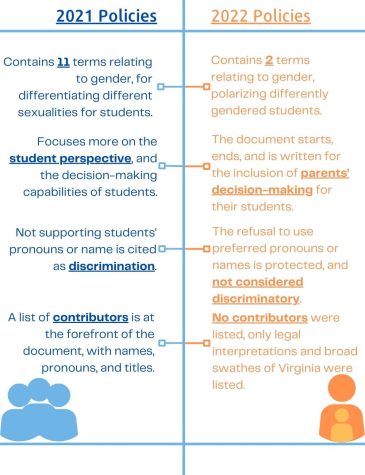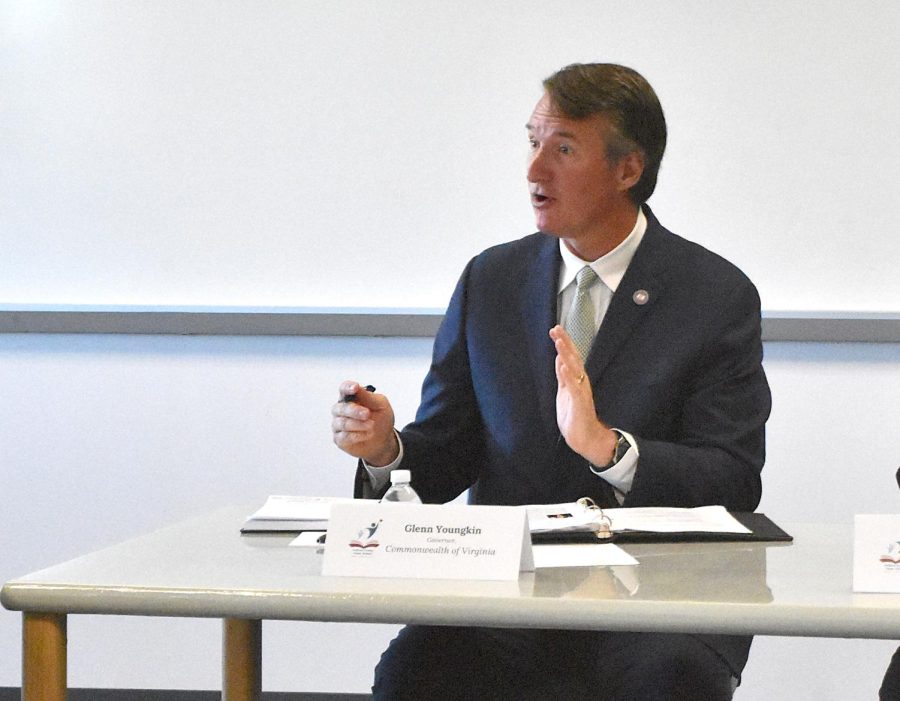Virginia Releases New Gender Policies For Schools
Governor Glenn Youngkin speaking at a meeting held at Forge, weeks later after this event he would announce the new gender support policies.
October 3, 2022
New guidelines for Virginia school systems were released Sept. 16. Dubbed “Model Policies”, these new policies outline the proposed actions that may be adopted by Virginia school systems to forcibly include parents in their students’ gender identity expression within their respective schools.
The model policies are required to go into effect by next month across all Virginia school systems. Meaning that school systems can have potentially wildly different takes on the new guidelines.
What Changed?
The newest policies officially remove the previous policies, stating the reason for removal as, “The 2021 Model Policies promoted a specific viewpoint aimed at achieving cultural and social transformation in schools. The 2021 Model Policies also disregarded the rights of parents and ignored other legal and constitutional principles that significantly impact how schools educate students, including transgender students.”
For instance: both policies state that bullying, for any reason, is not acceptable within the school system, including bullying based on identity. But, both policies differ in two key ways, with the 2021 policies focusing more on students while 2022 focuses more on the parental side.
The 2022 policies state that, “Empowering parents is not only a fundamental right, but it is essential to improving outcomes for all children in Virginia.”
In the proposed policy changes, all students who wish to be referred to as, or treated as, a different gender than assigned at birth will be required to have their requests approved by their parents, unless they are the age of 18 or older or are emancipated. It is no surprise that the Youngkin administration would propose plans such as these; the governor ran on the importance of parents having more control and presence in the school system and their student’s educational experience.
One of the guiding principles of the 2022 Model Policies is that “Parents are a child’s primary and most important educator. In partnership with parents, public schools, teachers, counselors, and administrators also play an essential role in the education of children in Virginia.”
Policy Differences, Page by Page
The opening of the older plans starts with a list of acknowledgments, including said person’s names, occupations, and pronouns. The newer plans do not.

The introduction sections for the older documents state the need for a safe and supportive school environment as the creating principle of the documents, and show an understanding that students do not always fit into a specific category relating to gender. The newer documents lay out the same concern for a supportive environment, but without showing an understanding of the gender construct, and while also including parental rights in the introduction.
Later, the newer policies contain eleven definitions in their terminology list, that are broken down to describe a substantial part of the gender construct, such as: cisgender, nonbinary, sex assignment, and gender-expansive. The newest policies only have four terms, with only two being about gender, both being simplified concepts: sex and transgender student.
The newer document’s guiding principles pages lead with respecting parental beliefs and values, pushing any mention of student-centered topics to the second page of the guiding principles’ page. The older documents focus nearly purely on students and the student experience, while again showing a complex understanding of the gender construct.
Legal interpretations in both of the policies vary greatly. The older policies for example use the First and Fourteenth Amendments to support varied gender identities and freedom of students to express themselves. But, the newer policies use the First Amendment to counter what it sees as indoctrination, stating the First Amendment forbids, “government actors from requiring individuals, including children in public schools, to adhere to or adopt particular ideological beliefs.” The newer policies also use the Fourteenth Amendment to further its support of heavy parent involvement in the school system, especially for their student.
Another substantial difference is about the treatment of staff who do not use the student’s preferred pronouns and or preferred name. The older policies stated that any faculty member who refused to use the student’s preferred name or preferred pronouns would have those actions labeled as discriminatory, and would face repercussions. On the other hand, the newest policies state that the First Amendment protects those who refuse to use preferred pronouns or names.
What’s next?
Although faced with much protest, the policies are currently planned to take effect in some way by next month. The policies will not go into effect without challenge, with many organizations planning to face the policies head-on in various legal battles.
The 2022 model policies do more than require parental involvement in gender expression, they also pose specific instructions limiting trans students’ access to bathrooms and sports.
Students are also not silent about the newest plans, staging walkout protests throughout Virginia schools on Sept. 27, with Forge participating in the walkouts that day as well.




